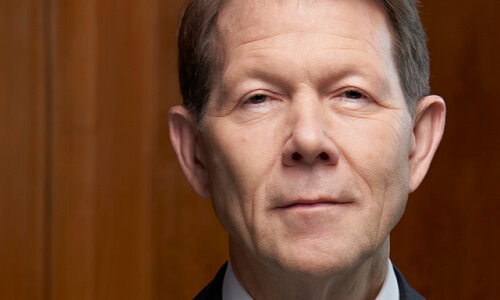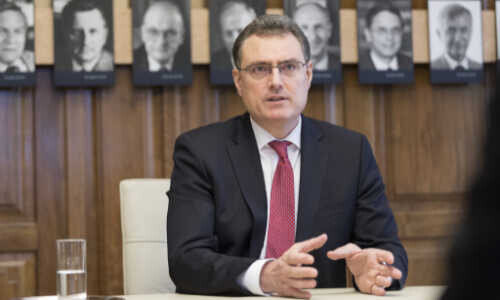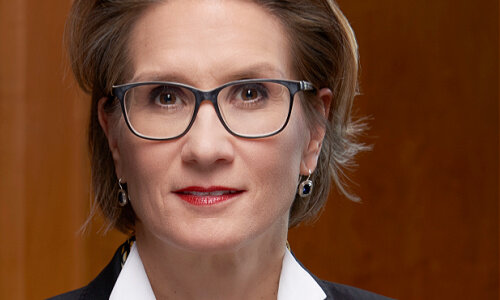Switzerland’s central bank is gearing up for a politically-charged search for a new governor that will set the course of its future strategy – and succession of top man Thomas Jordan.
The Swiss National Bank’s board will spend coming months searching for candidates to replace its second-in-command Fritz Zurbruegg (pictured below), who is stepping down mid-year. The 61-year-old’s exit comes as the central bank’s policy is increasingly politically debated.

The succession will set the course for the future head of the SNB as well as for its strategy, SNB expert Fabio Canetg told finews.com. «This person stands excellent chances of eventually replacing Thomas Jordan, who will soon be the second-longest standing president in the SNB’s history,» he said. Canetg, who has a PhD in monetary economics, is a lecturer who operates «Geldcast» (podcast in German).
Spring Nomination
The Swiss central bank didn't elaborate on the search process, which is governed by its statutes. The council which oversees the SNB, which includes Julius Baer Chairman Romeo Lacher, seeks and proposes candidates to the government, which then appoints the successful applicants. The council can be expected to suggest a replacement in spring.
The SNB’s «natural order» is to advance existing governors – which would mean that Andréa Maechler slides into Zurbruegg’s spot as deputy to President Thomas Jordan (pictured below). A 58-year-old Swiss economist, Jordan will next year become the second-longest-standing head in the Swiss central bank’s history.

(Image: Keystone)
Jordan’s tenure has been defined by an incredibly expansive policy including negative interest rates to dissuade foreign investment in the Swiss franc and a bloated balance sheet from intervening in foreign currency markets. Besides criticism virtually from its own ranks, the SNB is also at the epicenter of a political fight.
Lawmakers Debate Profits
Swiss lawmakers are currently debating a proposal to disperse the proceeds of surcharges on franc deposits. The SNB took in roughly 800 million Swiss francs ($871 million) in the first three quarters of this year from levying the franc charges.
Left- and right-wing parliamentarians are united in wanting the money from introducing negative interest rates to go towards financing depleted social security (in German). No precise numbers exist, but the backers of this bill estimate that roughly 10 billion francs have rolled in since the central bank began the policy in 2015.
Threat To Independence
This represents a threat to the SNB’s independence, both the government and Swiss business lobby Economiesuisse have criticized (in German). It is the latest in a series of political attacks on the central bank – Jordan, Zurbruegg, and Andréa Maechler (pictured below) form the three-person governing board, which has faced down popular initiatives including a challenge to its gold reserves (2014) and sovereign money (2018).

It has also withstood criticism from within its own circle: academic Dirk Niepelt called for the SNB to review its strategy due to the increasingly complex world it faces. Last week, monetary doyen Ernst Baltensperger suggested the central banks including the Swiss are downplaying fears of inflation.
Climate Criticism
The departure of Zurbruegg – who may take on a private sector role, «Neue Zuercher Zeitung» (behind paywall, in German) reported – is also bad news for climate change advocates. The Swiss National Bank has been criticized for an equity portfolio that is heavily biased toward fossil fuels. The SNB disputes this and has said its hands are tied by its mandate.
Of the three current governors, Zurbruegg was politically most closely aligned with environmentalists, though he is not a member of a political party. The SNB has not been very responsive or receptive to the criticism of its role in climate change.
Internal Front-Runner
The cornucopia of issues colliding at the SNB means Switzerland’s chief political parties are likely to seize on the succession of Zurbruegg. This year, the SNB also faced allegations of institutional sexism and favoritism, on top of the monetary policy skepticism and more fundamental calls such as enlarging its governing board or publishing its minutes, as the U.S. Federal Reserve does.
Canetg has named several potential successors to Zurbruegg (and thus eventually to Jordan, whose mandate was recently extended to 2027), including Martin Schlegel as the front-runner. The 45-year-old Swiss economist is an SNB «lifer» whose career took off after less than two years running the central bank's Asian trading floor: he advanced to Jordan’s deputy three years ago.




































